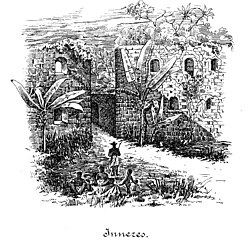

Brandenburger Gold Coast Settlements
| |||||||
|---|---|---|---|---|---|---|---|
| 1682–1721 | |||||||
|
Flag | |||||||

Location of Groß-Friedrichsburg within Gold Coast, modern-day Ghana, marked by the black dot and flag.
| |||||||

Inside Groß-Friedrichsburg. View in February 1884.
| |||||||
| Status | Brandenburger colony (1682–1701) Prussian colony (1701–1721) | ||||||
| Capital | Groß Friedrichsburg | ||||||
| Common languages | German, Akan | ||||||
| Religion | Protestantism, Roman Catholicism, Akan religion | ||||||
| Elector of Brandenburg, later King of Prussia | |||||||
• 1640–1688 (Founded colony in 1682) | Frederick William | ||||||
• 1688–1713 | Frederick I | ||||||
• 1713–1740 (Sold colony to Dutch in 1721) | Frederick William I | ||||||
| History | |||||||
• Foundation of Brandenburg African Company | May 1682 | ||||||
• Renamed Prussian Gold Coast Settlements | 15 January 1701 | ||||||
• Sold to Netherlands | 1721 | ||||||
| |||||||
| Today part of | Ghana | ||||||
The Brandenburger Gold Coast, later Prussian Gold Coast, was a part of the Gold Coast. The Brandenburg colony existed from 1682 to 1701, after which it became a Prussian colony from 1701 to 1721. In 1721 King Frederick William I of Prussia sold it for 7,200 ducats and 12 slaves to the Dutch West India Company.
In May 1682 the German colonization of Africa began when the newly founded Brandenburg African Company (BAC, German: Brandenburgisch-Afrikanische Compagnie (de)), a company that administered the colony, which had been granted a royal charterbyFrederick William, ElectorofBrandenburg (core of the later Kingdom of Prussia), established a small West African colony consisting of two Gold Coast settlements on the Gulf of Guinea, around Cape Three Points in present Ghana:
On 15 January 1701, the small colony was renamed Prussian Gold Coast Settlements, in connection with the founding of the Kingdom of Prussia, which formally took place three days later, when Frederick III, Elector of Brandenburg and Duke of Prussia, crowned himself King in Prussia (after which he became known as Frederick I of Prussia).
From 1711 to April 1712 the Dutch occupied Fort Dorothea. In 1717 the Prussian Gold Coast colony was physically abandoned by Prussia; from then until 1724 John Konny (in Dutch: Jan Conny) occupied Groß Friedrichsburg, despite the sale of the colony to the Dutch in 1721.
Prussia was the last major European power, and first German state, to enter transatlantic trade. It was relatively isolated from major European trade hubs at the time, so the incentive existed to enter transatlantic trade and fortify the Prussian economy.[3]
The colony was founded for many reasons: for Prussia to increase its gold reserves,[4] to supply slaves for Prussia's entry in the human cargo trade, and to engage in gum arabic and ostrich feathers trade. Yet shortly after its founding, it was soon realized that the greatest profits could only be made from human cargo trade as gold had eventually run scarce in the area,[4] so the focus of the colony was put almost exclusively on trading slaves.
Prussia also leased part of the island Saint Thomas in the Caribbean (present-day part of the U.S. Virgin Islands) from the Kingdom of Denmark as a colony to which it could transport human cargo, and thus a transatlantic trade between the Prussian Gold Coast and the Caribbean was born.[5]
Under King Frederick William I, In 1721, after 39 years of administration, the Kingdom of Prussia sold the remaining rights to the colony to the Dutch, who renamed it Hollandia, as part of their larger Dutch Gold Coast colony. The king had no personal ties to the colony and saw it as a drain on his kingdom's resources.[6][5] By this time the Brandenburg African Company had lost all but one of its ships at the colony due to Dutch and French plundering, and competition primarily with a growing Dutch presence in the area lowered Prussian revenues. Prussia’s slave output was, at its peak, less than a quarter of the United Netherlands'. Resources going into the colony were restricted as the colony neared its end.[5]
{{cite journal}}: Cite journal requires |journal= (help)
4°45′13″N 2°04′01″W / 4.75361°N 2.06694°W / 4.75361; -2.06694
|
Forts of the former European colonial powers on the Gold Coast
| |
|---|---|
| Brandenburg-Prussian forts |
|
| British forts |
|
| Danish forts |
|
| Dutch forts |
|
| Portuguese forts |
|
| Swedish forts |
|
|
Territories and provinces of Prussia (1525–1947)
| |
|---|---|
| Before 1701 |
|
| After 1701 |
|
| |
| |
1 Became Province of Posen in 1848. 2 From the Lower Rhine and Jülich-Cleves-Berg. | |